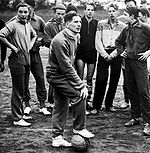George Raynor
 |
|||
| Personal information | |||
|---|---|---|---|
| Full name | George Sidney Raynor | ||
| Date of birth | 13 January 1907 | ||
| Place of birth | Hoyland Common, England | ||
| Date of death | 24 November 1985 (aged 78) | ||
| Youth career | |||
| Elsecar Bible Class | |||
| Mexborough Athletic | |||
| Senior career* | |||
| Years | Team | Apps | (Gls) |
| 1929–1930 | Wombwell | ||
| 1930–1931 | Sheffield United | ||
| 1932–1933 | Mansfield Town | ||
| 1933–1935 | Rotherham United | ||
| 1935–1938 | Bury | ||
| 1938–1939 | Aldershot | ||
| Teams managed | |||
| 1943–1945 | Iraq XI | ||
| 1945–1946 | Aldershot Reserves | ||
| 1946–1954 | Sweden | ||
| 1947–1948 | GAIS | ||
| 1948–1952 | AIK | ||
| 1952–1954 | Åtvidaberg FF | ||
| 1954 | Juventus | ||
| 1954–1955 | Lazio | ||
| 1956 | Coventry City | ||
| 1956–1958 | Sweden | ||
| 1958–1960 | Skegness Town | ||
| 1960 | Djurgårdens IF | ||
| 1961 | Sweden | ||
| 1967–1968 | Doncaster Rovers | ||
| * Senior club appearances and goals counted for the domestic league only. |
|||
George Sidney Raynor (13 January 1907 in Hoyland Common, Yorkshire – 24 November 1985) was an English professional footballer and one of the most successful international football managers ever. One of his greatest achievements was taking the Sweden national football team to a World Cup final, and he also managed them to an Olympic gold medal. Before 1966 FIFA World Cup, he was the only Englishman to put a national team into a Final of a World Cup.
Raynor first played football in the non-Leagues for Elsecar Bible Class, Mexborough Athletic and Wombwell. When he did sign professional forms Raynor's career took him only on an uninspired jaunt around the Football League. His first professional club was Sheffield United whom he joined in 1930, making only one first team appearance in the two years he was with the club. Between 1932 and 1939 he played for four different League clubs, the last of these (Aldershot) in the truncated season before the start of the War. He signed up as a physical training instructor ('PTI's') in 1939 in order to train soldiers in the British Army. The Football Association had requested that all professional footballers become PTI's if they were not inclined to see active service. Raynor was posted to Iraq and whilst in the course of working as a training instructor in Baghdad, Raynor helped a fellow teacher club together a group of students into a team which toured the neighbouring states as a representative of Iraq. His work in Iraq came to the notice of the Secretary of Stanley Rous. Thereafter, as Brian Glanville notes (with some poetic licence) in his The Story of the World Cup, "the FA whisked him in 1946 from reserve team trainer at Aldershot to the team managership of Sweden".
...
Wikipedia
